Titbits and News from the Mare Nostrum
Cleopatra VII: Unveiling the Life, Loves & Legacy of Egypt's Last Queen
This is the story of Cleopatra VII, Egypt's last pharaoh. We explore her political genius, legendary romances with Caesar and Antony, and the truth behind the "seven Cleopatras" myth.
By Nick Nutter on 2025-07-3 | Last Updated 2025-07-5 | Titbits and News from the Mare Nostrum
This article has been visited 40,255 times

Cleopatra portrayed by Elizabeth Taylor
Beyond the Legend: Unveiling the True Story of Cleopatra, Egypt's Last Pharaoh
When you hear the name "Cleopatra," what comes to mind? A queen of unparalleled beauty, a seductive temptress, a powerful ruler who held the hearts (and other bits) of Roman giants in her hands? All these images, woven into the fabric of history and Hollywood, are largely true – but they belong to one extraordinary woman: Cleopatra VII Thea Philopator who was born in Alexandria, Egypt, around 70/69 BC, and died in Alexandria at the age of 39 after committing suicide in 30 BC.
Do you enjoy my articles? For your reading pleasure, this website does not carry third party ads. You could help me write more articles by buying me a cup of coffee.
The First Six Cleopatras
It's a common misconception that Egypt was ruled by a succession of seven equally powerful Cleopatras. While there were indeed other women named Cleopatra within the Ptolemaic dynasty that ruled Egypt after Alexander the Great, Cleopatra VII is the one who dominated the historical stage. For clarity, here's a brief look at the other Cleopatras, though their reigns were often brief, their influence limited, or they were overshadowed by more dominant male rulers or, indeed, by the Cleopatra:
Cleopatra I: Ruled as regent for her son Ptolemy VI (176-172 BC) and then as co-regent with him (175-170 BC).
Cleopatra II: Ruled as co-regent with her brother Ptolemy VI and her husband Ptolemy VIII (170-164 BC, 163-145 BC), and as sole monarch (131-127 BC, 124-116/5 BC).
Cleopatra III: Ruled as co-regent with her mother Cleopatra II and her husband Ptolemy VIII (140-132/1 BC, 127-116 BC).
Cleopatra IV: Ruled briefly with her brother Ptolemy IX (116 BC) before being expelled.
Cleopatra V: Co-ruled with Ptolemy XII (79-69 BC) and then disappeared from the historical record.
Cleopatra VI: Ruled briefly with Berenice IV (58-57 BC).
Cleopatra VII
The historical spotlight shines almost exclusively on Cleopatra VII because, quite simply, she was the last and most formidable pharaoh of ancient Egypt. Born in 69 BC,the daughter of Ptolemy XII (Ptolemy Auletes) and Cleopatra V, Cleopatra VII was not, as often imagined, solely of Egyptian descent. She was a direct descendant of Ptolemy I Soter, one of Alexander the Great's generals, making her ethnically Greek Macedonian. Yet, she embraced her Egyptian heritage unlike many of her predecessors, famously being the only Ptolemaic ruler to learn the Egyptian language. This move was not merely a gesture of cultural appreciation; it was a shrewd political manoeuvre that endeared her to her people and solidified her legitimacy.
A Reign Forged in Fire and Intellect
Cleopatra's rise to power was fraught with peril. She initially co-ruled with her younger brothers, Ptolemy XIII and Ptolemy XIV, as was customary in the Ptolemaic dynasty, but sibling rivalry and political machinations quickly led to civil war. Her brilliance, however, lay not just in her royal lineage but in her formidable intellect, sharp political acumen, and extraordinary charm.
Cleopatra and Julius Caesar


Gaius Julius Caesar (12th or 13th July, 100 BC - March 15, 44 BC)
It was during these turbulent times that she famously encountered Julius Caesar. The story of her being smuggled into his presence in a carpet (or laundry bag, depending on the account) shows how audacious and determined she was. Their alliance was not merely romantic; it was a calculated political partnership that served both their ambitions. With Caesar's support, Cleopatra regained her throne and solidified her power, even bearing him a son, Caesarion (Little Caesar).
Their relationship, though passionate, was ultimately cut short by Caesar's assassination in 44 BC. Cleopatra, ever the pragmatist, understood that her survival and Egypt's independence depended on forging new alliances with the rising powers of Rome.
Love, Power, and the Fateful Embrace of Mark Antony


Marcus Antonius (14 January 83 BC – 1 August 30 BC)
Enter Mark Antony, one of the triumvirs who inherited Caesar's power. Their initial meeting in Tarsus in 41 BC is legendary – Cleopatra arriving on a magnificent barge, adorned like the goddess Isis, captivating Antony instantly. Their relationship blossomed into one of history's most iconic love affairs, a blend of deep affection, shared ambition, and extravagant living.
For over a decade, Cleopatra and Antony were inseparable, ruling the eastern Roman Empire together. She bore him three children, further cementing their bond. Their vision was a powerful, independent Egypt allied with a strong eastern Roman presence, a counter to Octavian's growing influence in the West.
However, their powerful alliance ultimately fuelled Octavian's propaganda machine. He painted Antony as a man corrupted by an "eastern temptress," abandoning Roman values for an exotic queen. The final showdown came at the Battle of Actium in 31 BC, a devastating naval defeat for Antony and Cleopatra.
Facing inevitable capture and the humiliation of being paraded through Rome as a conquered queen, Cleopatra chose a different path. In 30 BC, she took her own life, famously allowing an asp to bite her, thus preserving her dignity and denying Octavian the ultimate triumph. Antony, upon hearing false news of her death, had already fallen on his own sword.
The End of an Era
Cleopatra VII's death marked the end of the Ptolemaic dynasty and the beginning of Egypt as a Roman province. She was the last true pharaoh, a woman who, despite immense pressure and political intrigue, fought fiercely to preserve her kingdom's independence and her own legacy.
Her life was a whirlwind of political genius, strategic alliances, and intense personal relationships. She was not just a beautiful face; she was a polyglot, a skilled negotiator, a brilliant strategist, and a devoted mother. The stories and legends surrounding her may have grown over two millennia, but the core truth remains: Cleopatra VII was a queen of immense power, intellect, and charisma, who left an indelible mark on the annals of history. Her story continues to captivate us, a tribute to the enduring power of a woman who dared to challenge the might of Rome.
Do you enjoy my articles? For your reading pleasure, this website does not carry third party ads. You could help me write more articles by buying me a cup of coffee.
 Dana Island, oldest ancient shipyard
Dana Island, oldest ancient shipyard A Bronze Age Courier Service
A Bronze Age Courier Service Cyrene's Lost Treasures
Cyrene's Lost Treasures The Invisible Enemy
The Invisible Enemy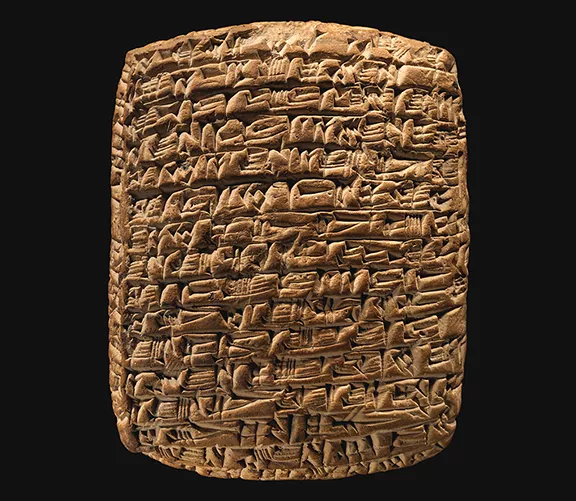 The World's First Company
The World's First Company The Copper Age Site of Oued Beht
The Copper Age Site of Oued Beht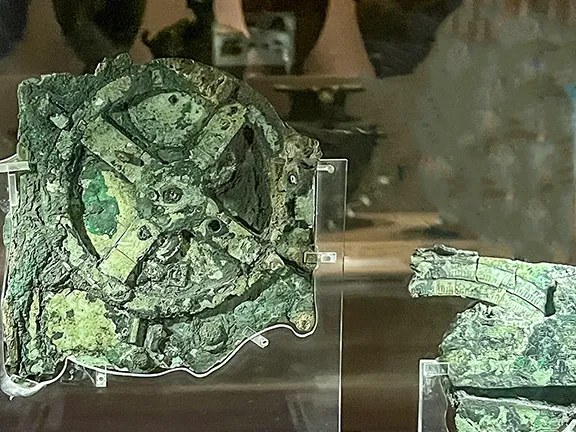 How the Antikythera Mechanism Works
How the Antikythera Mechanism Works Kach Kouch and Iberia
Kach Kouch and Iberia Mediterranean Diet Evolution
Mediterranean Diet Evolution Hidden Colours of Ancient Statues
Hidden Colours of Ancient Statues Alexandria Library's True Fate
Alexandria Library's True Fate Six Great Ancient Libraries
Six Great Ancient Libraries Ancient Greek Technology
Ancient Greek Technology Broadening Horizons
Broadening Horizons The Nadītu Investors of Sippar
The Nadītu Investors of Sippar New light on Hadrian
New light on Hadrian The Dolmens of La Lentejuela Teba
The Dolmens of La Lentejuela Teba New Cave Art Discovery in Valencia region
New Cave Art Discovery in Valencia region La Cabaneta Oldest Roman Forum in Iberian Peninsula
La Cabaneta Oldest Roman Forum in Iberian Peninsula New Discoveries at Ancient Sunken City of Thonis-Heracleion
New Discoveries at Ancient Sunken City of Thonis-Heracleion Europe's Oldest Shoes Found: 6,000-Year-Old Sandals Woven from Grass
Europe's Oldest Shoes Found: 6,000-Year-Old Sandals Woven from Grass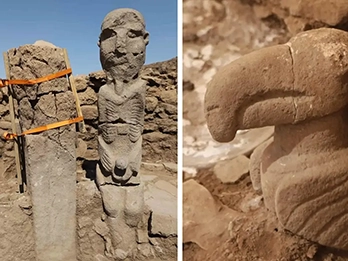 Discoveries at Gobekli Tepe and Karahan
Discoveries at Gobekli Tepe and Karahan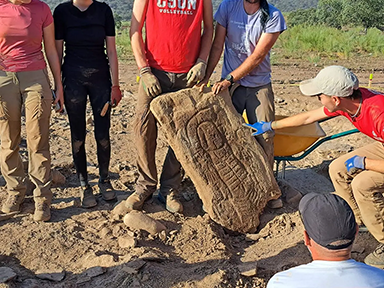 Decorated Stelae found in Canaveral de Leon, Spain
Decorated Stelae found in Canaveral de Leon, Spain The Nebra Sky Disc: A Bronze Age Calendar
The Nebra Sky Disc: A Bronze Age Calendar New Exhibition at the Archaeological Museum in Alicante
New Exhibition at the Archaeological Museum in Alicante Bronze Age: A Golden Age for Jewellery
Bronze Age: A Golden Age for Jewellery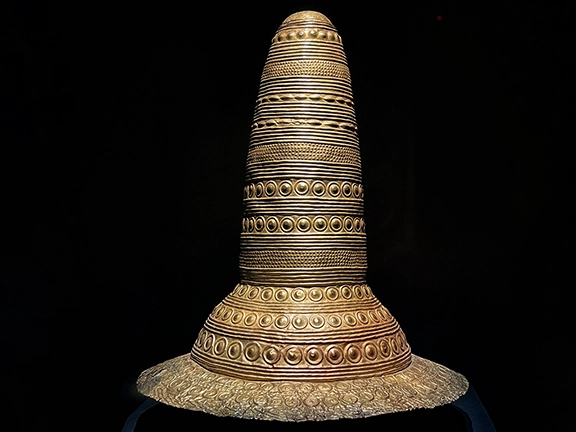 The Golden Hat of Schifferstadt
The Golden Hat of Schifferstadt